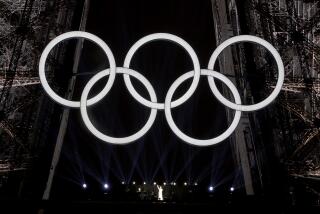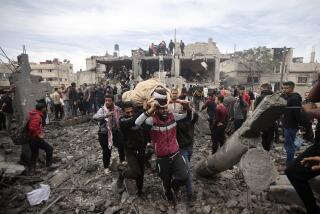Profile : French Doctor with a Flair Spearheads Aid to Somalia : ‘Without the press, more people die,’ says Cabinet Minister Kouchner, who loves the limelight.
- Share via
PARIS — August, when much of the world’s attention was focused on the Olympic Games in Barcelona, French Minister of Health and Humanitarian Action Bernard Kouchner was in Somalia visiting camps of starving children with his team of globe-trotting doctors and a television crew.
Kouchner, 53, thin, blond and movie-star handsome, body taut from daily jogging in the Luxembourg Gardens, rarely goes on a humanitarian mission without at least one TV crew.
“Contrary to what a lot of people think,” Kouchner recounted with typical brashness in a weekend interview here, “it is not because I like to see my face on the screen. I’ve been on television a thousand times and I don’t give a damn. It doesn’t give me any sexual thrill to be on the little screen. But I discovered long ago in the Biafran war that, without the press, more people die.”
After Biafra in 1968, where he served as a young gastroenterologist with the International Red Cross, Kouchner founded Medecins Sans Frontieres (Doctors Without Borders) and, after an ideological split with the first group, Medecins du Monde (Doctors of the World), both medical relief organizations.
He led humanitarian mercy missions in dozens of countries, including Jordan, Lebanon, Syria, Chad, Vietnam, Cambodia, Uruguay, Peru, Guatemala, El Salvador, Honduras, Sri Lanka and Afghanistan. Among his missions: operating hospital ships in the South China Sea that were credited with rescuing about 15,000 Vietnamese boat people from 1979 to 1987.
In his five years as chief of France’s unique government agency for international humanitarian activities, Humanitarian Action of France, Kouchner has spearheaded his country’s relief efforts in Sudan, Liberia, Iraqi Kurdistan, Armenia and, more recently, Bosnia and Somalia.
*
Many credit Kouchner, along with Algerian diplomat Mohamed Sahnoun, the special U.N. representative formerly assigned to Somalia, as being largely responsible for stirring up the international concern that finally led to the unprecedented, U.S.-led military intervention in that famine- and violence-torn country.
It was last Aug. 7 in Baidoa, Somalia, that Kouchner, wearing a crisp khaki field suit, knelt in a room full of half-dead infants--silent and vacant-eyed with starvation. “While you are watching the Olympic Games,” he shouted into the accompanying TV camera, “thousands of children like these are starving in the forgotten land of Somalia. Take pity on Somalia.”
The image of Kouchner and the emaciated children was beamed to Paris by satellite and carried live on the main evening news program. The shocking contrast with the lavish sports-entertainment extravaganza taking place in Catalonia achieved just what Kouchner had hoped. Geraldo Rivera could not have done better.
As usual, Kouchner’s guerrilla TV tactics sparked a minor controversy back home. Even some of his most loyal supporters--men and women who had been with the consummate “French Doctor” since he founded Medecins Sans Frontieres in 1971--felt that this time their humanistic hero had gone too far. It is one thing to remind people of the miseries of the world; it is another to rub their noses in it.
Unfazed by the criticism, Kouchner continued to push the Somalia cause wherever he could, pausing only to make other humanitarian missions to Bosnia and Croatia. In October, Kouchner asked French schoolchildren to bring packets of rice to their classrooms for distribution in Somalia. The children responded in dramatic fashion, providing 9,200 tons of food.
Over the months leading up to the U.S.-led military action, Kouchner met four times with U.N. Secretary General Boutros Boutros-Ghali, urging emergency U.N. intervention in the deteriorating Somalian scene. His pressuring, cajoling, lecturing and maneuvering at the United Nations drove Boutros-Ghali into a rage at one point, causing the usually mild-mannered Egyptian to describe the Frenchman as an “unguided missile.”
To his open disgust, Kouchner’s own government turned down a direct request from Boutros-Ghali to lead the military mission to Somalia. But once President Bush agreed to take on the job, Kouchner could justifiably share in the credit.
As might be expected, when U.S. Marines waded ashore on Somali beaches, Kouchner was there too, looking like a humanitarian version of Gen. Douglas MacArthur as he posed in the surf and smiled for cameras with bags of “French schoolchildren’s rice” on his shoulders.
Kouchner’s free-lance international grandstanding had already infuriated some fellow ministers in the French government. “Kouchner raises the eternal question,” sniffed an aide to one especially miffed minister in a recent interview. “Is he serving others or serving himself?”
The MacArthur resemblance caused even more complaining by French politicians and the press--which has sarcastically nicknamed Kouchner “Minister Without Borders.” The satirical French weekly newspaper, Le Canard Enchaine, featured a front-page caricature of him carrying a sack of rice under the headline “Kouchner in Showmalia.”
Before the National Assembly, the French lower house of Parliament, Defense Minister Pierre Joxe muttered something about how “tact and humility” are important virtues when it comes to international humanitarian aid.
Joxe initially opposed sending French troops to Somalia even to back up the Americans. Then Kouchner, employing the political equivalent of blackmail, convinced him of the possible public relations downside of having “French rice” delivered by “American troops.”
With parliamentary elections set for next March, Joxe quickly dispatched 2,000 French Legionnaires from their base in nearby Djibouti.
For all the testiness of his relations with fellow ministers and the media, Kouchner’s tireless efforts on behalf of the suffering people of Bosnia and Somalia have won him an immense following. Opinion polls show him to be by far the most popular political figure in the country. Matrimonial agencies report that more and more women are asking for the “Kouchner type.”
Aging French President Francois Mitterrand, who in a display of chief executive derring-do traveled with Kouchner into Sarajevo in June and declared himself rejuvenated by the experience, has adopted his controversial minister as his newest dauphin. Mitterrand called Kouchner to his side in Brittany when the 76-year-old French leader was recuperating from treatment for cancer of the prostate.
In humanitarian relief efforts that began with his work in the 1968 Biafran Civil War, Kouchner almost single-handedly created the concept he calls le droit d’ingerence (the right to interfere) in tragic situations of human suffering caused by war and natural disasters. The idea is slowly being accepted as an important principle of international law.
In fact, Boutros-Ghali, a smooth diplomat who is no great fan of Kouchner’s sometimes abrasive style, adopted the droit d’ingerence concept in an essay he wrote justifying the Somalian effort.
“Somalia is just the beginning of the development of the right of interference,” Kouchner said during an interview in his office in the French Ministry of Health. “When I urged the same kind of action in Beirut everybody made fun of me. For years, people considered us--me and my friends--as kind of goofy Boy Scouts. Hippy doctors. But there is beginning to develop a kind of humanitarian conscience. Public opinion has begun to support this kind of action.”
*
For a man who has spent 25 years dodging bullets and cleaning up messes in the most troubled backwaters on Earth, Kouchner is remarkably upbeat about the future.
“Now that communism is dead,” said Kouchner, “I think we can start talking about changing the world, eliminating war and poverty, eliminating the demographic, economic disparities of north and south. . . . “
Despite his soaring ego and brash style, Kouchner, the son of a leftist French doctor in Montreuil-sous-Bois, concedes: “Sometimes I talk too much. It’s because I believe you should be able to say everything you want. But it’s true that some people prefer their political figures to speak in cliches.”
But his self-criticism goes only so far.
When the interview turned to the sometimes petty jealousies of his political confreres, Kouchner caused two press counselors in the room to cringe as he snapped: “I don’t have any confreres. I have only competitors and those who are jealous of me. I don’t give a damn. The only thing that has guided me in life has been victims and the plight of the victims. If the Somalians didn’t want my rice, I would have never taken it to them.”
Biography
Name: Bernard Kouchner
Title: French Minister of Health and Humanitarian Action
Age: 53
Personals: Born in Avignon, France. Author of six books. Has written scripts for television series about a police station and night hospital work. Hobbies are jogging and singing. Married to television newscaster Christine Ockrent. Has four children, ages 5 to 21.
Quote: “I prefer cameras to bazookas. I prefer televised wars to the kind of real wars that kill people. In 25 years I have seen many wounded, much suffering because of these real wars.
More to Read
Sign up for Essential California
The most important California stories and recommendations in your inbox every morning.
You may occasionally receive promotional content from the Los Angeles Times.










